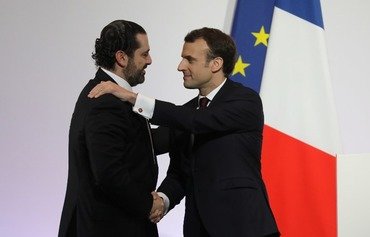Lebanon has been taking steps to revitalize its economy, which has for decades relied heavily on remittances and the banking industry to generate income.
In early January, the Lebanese government began working with management consulting firm McKinsey & Co. and various economic bodies as part of a six-month process to formulate a new economic vision for the country.
Lebanon has one of the world's highest ratios of debt to gross domestic product (GDP), with government debt equivalent to around 146% of GDP in 2016.
While Lebanon depends on tourism and the banking industry, some see a pressing need to improve the productive sectors, rationalize spending, curtail waste and encourage privatisation in some sectors to reduce the fiscal deficit.
"Lebanon aims with the study to transform its economy from a rentier economy to a productive economy," said Economy and Trade Minister Raed Khoury.
The Lebanese government will be developing the plan, with the contracted company McKinsey playing an advisory role, he told Al-Mashareq.
The new economic vision will take medium- and long-term considerations into account in order to lay a stable economic foundation for Lebanon's future.
The process aims "to identify Lebanon’s economic identity and vision as well as identify the productive sectors in which Lebanon has an advantage", he said.
This will help the government design appropriate frameworks to develop these sectors and provide them with incentives, Khoury added.
"We will all work to carry out this plan through meetings and workshops attended by the ministerial economic committee, representatives of relevant ministries, the private sector, chambers of commerce, industry and agriculture, the Economic and Social Council and leading economic figures," he said.
The World Bank and the International Monetary Fund will have a monitoring role in the plan's development, he added.
Issues that hinder growth
Lebanon needs an economic vision, but its problem lies in a lack of governance more than a lack of vision, economic advisor Roger Malki told Al-Mashareq.
"Lebanon's economic crisis resulted from an accumulation of problems, both external and internal," he said.
An economic vision that contributes to improving the state’s administrative performance is necessary, he noted, "because Lebanon’s problem is not a lack of resources as much as it is the management of resources".
"Today we desperately need to take steps to foster growth," he added.
"We support any economic plan for Lebanon, however our chronic problem lies not in the plans, but in the implementation, follow up and sustainability," Fouad Zmokhol, president of the Association of Lebanese Business People in the World.
Lebanon’s economic problem lies not in the lack of studies, he told Al-Mashareq, as the economic crisis in Lebanon is always "linked to the lack of implementation and follow up and sincere intention to pursue development".
"The biggest obstacle in Lebanon is the constant fall back to square one after the process reaches the implementation stage, due to changes in government or ministers or the occurrence of a security incident or a political crisis," he said.
He stressed the need for private and public sectors and labour unions to commit to any new economic plan in order for it to reach the stage of implementation.

![A photo shows a view of the Lebanese capital Beirut. The Lebanese government has hired a management consulting firm to help it formulate a new economic vision for the country. [Junaid Salman/Al-Mashareq]](/cnmi_am/images/2018/02/16/11458-Lebanon-Beirut-economy-600_384.jpg)






